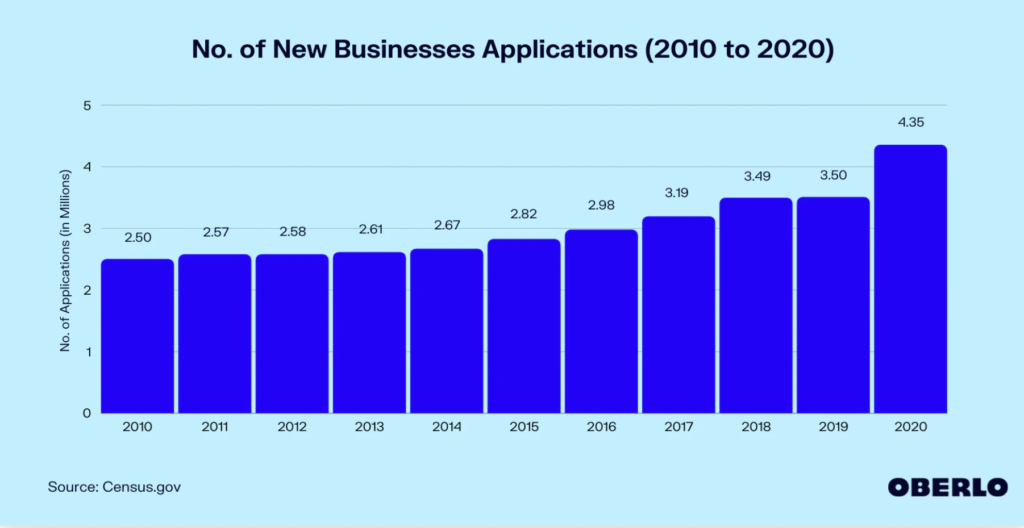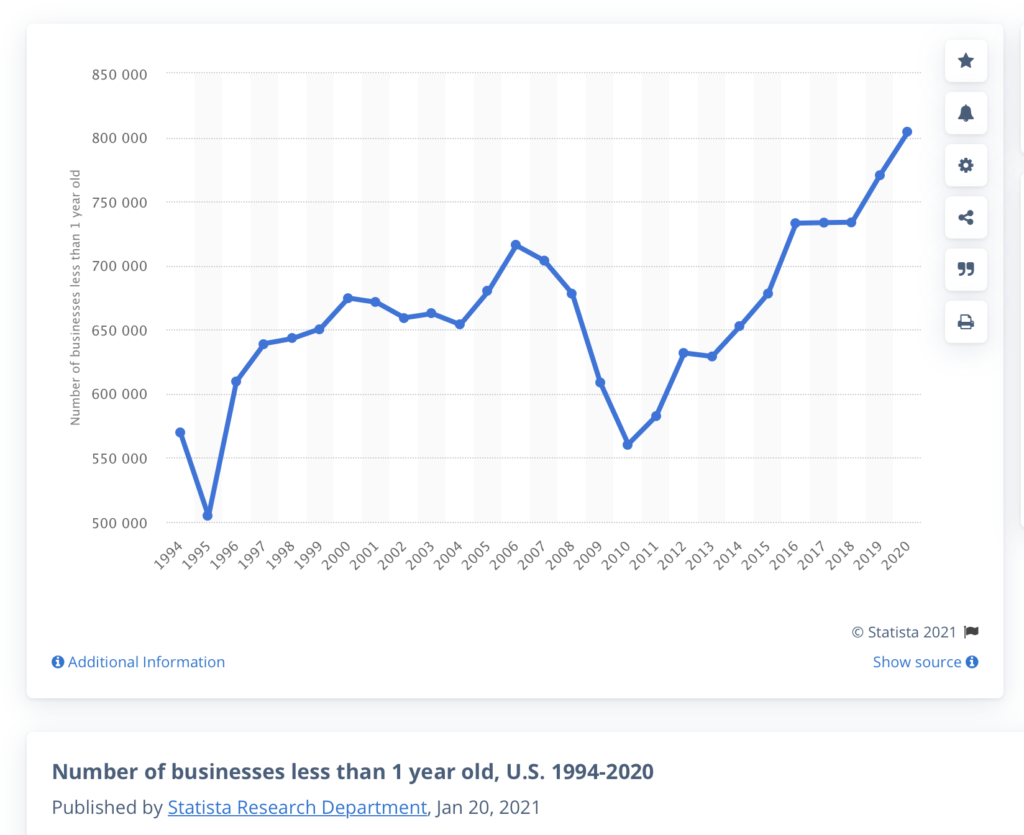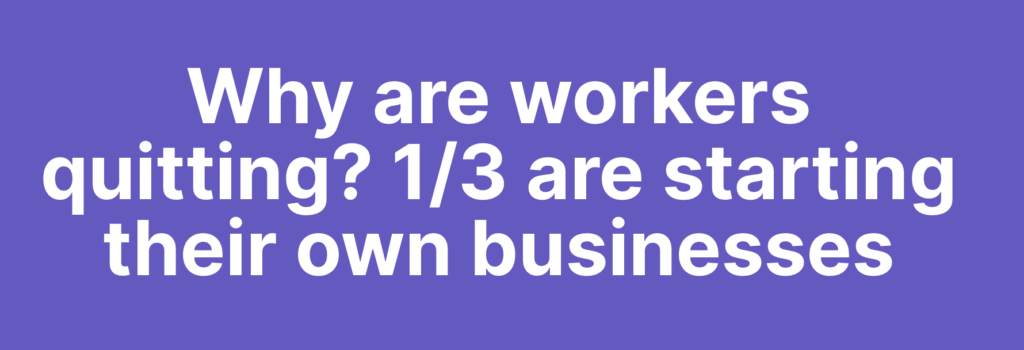As big trends go, I’d label this one blockbuster. Startup formation is on fire. It jumped 24% year-over-year in 2020 here in the U.S. Consider this from the Economic Innovation Group:
“A new Census Bureau dataset allows us to track early-stage entrepreneurial activity in almost real-time. For the duration of the pandemic, the Bureau’s Business Formation Statistics series has provided a detailed look at the number and character of new business applications on a weekly basis. Its findings suggest that the pandemic delivered a massive shock to American entrepreneurship that has seriously altered established trends in new business formation. Counter to expectations, 2020 shaped up to be the best year for business applications on record.” (Emphasis mine.)
Then there’s this analysis from Oberlo:
“In 2010, the number of new business applications came in at 2.50 million. But as new business statistics show, in 2020, 4.35 million applications were submitted. That’s a whopping 74 percent more. It is also a 24.19 percent increase from 2019 and the biggest increase of the past decade by a mile.”
[Note: This post first appeared as an article on Grit Daily.]
I’ve experienced (and survived!) at least five technology/business cycles since going entrepreneurial and founding my consultancy more than three decades ago. And each of these cycles drove a startup surge that was considerable. (One, the dot-com cycle, saw a reversal for a few years after it peaked in 2000. So, surprisingly, did the startup surge driven by the advent of the smartphone era, but that was due to the financial crash of 2008.) I benefited greatly from every single one of those surges – getting to partner with so many wide-eyed entrepreneurs who were doing some crazy, innovative things and reaped some big rewards.
But this latest explosion of startups – call it the Covid Surge, the #WorkFromAnywhere Surge, the Digital Transformation Surge – whatever name you want to hang on it, this baby stands well above the rest.
It’s More Than Just the ‘Cool Kids’
Today, it seems everybody wants to be a startup. Or at least work for a startup. Or start planning a startup. Or marry someone who has a startup. There’s even a term for those who wish they could do a startup, or who dream about doing it someday: “wannapreneur.”
Quite simply, these people just do not lust after a traditional career anymore. Seriously, when do you remember a time you felt this sorry for big corporations? They’re so unloved. (Wiping a tear.) Who in their right mind wants to work for one company for the rest of their career – or, hell, even five years anymore?
You, Mr. or Ms. Millennial, GenZer, GenXer, or even Boomer, have other ideas about how you want to live your life. In charge of your own destiny – that’s what. With a chance to build wealth well beyond what you could as an employee for the rest of your life.
Do I get an amen?
The Great Resignation: ‘Been Nice Knowing Ya, Boss’
What I say is driving this latest startup-surge-for-the-ages is not Covid, and not #WorkFromAnywhere, per se – rather, a by-product of it. It’s called freedom. People got a taste of freedom of when they want to work, and where. And, for many, how they do that work – without being under the nose of some boss.
Surely you’ve seen multiple stories by now about how so many people are quitting their jobs rather than go back to the office. LinkedIn alone will bury you in them. (Which raises the question, why do they write so much about all this quitting when it obviously affects their model? No question they’re quite dependent on big companies and their recruiting ads, and all the ladder-climbing robots who flog their corporate accomplishments on the platform. Makes you think LinkedIn is really going to need that freelance marketplace platform we keep hearing rumors about if it wants to keep growing anywhere near like it has.)
Granted, not everyone who’s quitting their job is doing a startup. Some are taking different jobs (duh). A slew of others would describe what they’re doing as simply “going freelance.” But many if not most of those are forming a legal entity to do that – the Company of Me – which shows how serious they are. It seems fair to assume the majority of these new entities are “solopreneurs” initially. That may or may not fit your definition of a startup – but, regardless, today we’re looking at huge company formation numbers overall, those that have already happened in 2020 and the similar numbers rolling in for 2021.
If you’re into economics, more great insights come from this article, including the following:
“There is a widespread perception that small businesses create the most jobs in the United States and other advanced economies. Research suggests that it is new businesses (emphasis mine), not small ones, that create these jobs (Haltiwanger et al. 2013). Studying the patterns in startup activity is hence an indicator of future employment growth.”
A Telling Finding
Amazingly, a survey just published by Digital.com found that one-third of workers who quit their jobs within the last six months started a business. That is just an unprecedented number in my experience!
More insights from the survey:
“Sixty-two percent of respondents say they are starting a business to be their own boss, and 60% say they are passionate about pursuing a business idea… Although many respondents say the pandemic influenced their decisions, they also cite several reasons for leaving the workforce. Forty-four percent of workers quit their jobs because they want better wages and benefits, 42% want to focus on their health, and 41% desire a more rewarding career. Sixty percent of new entrepreneurs learned about launching a startup business during the pandemic lockdown.”
Many startups begin life as personal service companies. Some of those actually go on to become product companies, whether hardware, software, even manufacturing businesses. A great many upstarts during the Covid era were founded as retail or ecommerce ventures. Online shopping went ballistic during the pandemic, and so many smart entrepreneurs took advantage of that.
It’s Easier Today
Historically speaking, entrepreneurs in the U.S. today have it pretty nice.
Consider all the factors that make their plight not nearly as difficult as it used to be:
• The low cost of starting a business
• The speed of creating a business entity (at least in most states; looking at you, California)
• Accessibility to capital, with a myriad of funding sources
• The low cost of capital these days
• And so many resources to learn how to do a startup, with organizations (both for-profit and nonprofit) practically tripping over each other to help entrepreneurs. These resources encompass many low-cost and even free services – coaching, classes, mentorship, accelerator programs, competitions with cash awards, and the list goes on.
Speaking of resources for starting a business, the outfit that sponsored the above survey, Digital.com, offers a wealth of links for new entrepreneurs.
So, What Are You Waiting For?
There’s never been a better time. But then, I’m biased.










Recent Comments